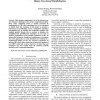Free Online Productivity Tools
i2Speak
i2Symbol
i2OCR
iTex2Img
iWeb2Print
iWeb2Shot
i2Type
iPdf2Split
iPdf2Merge
i2Bopomofo
i2Arabic
i2Style
i2Image
i2PDF
iLatex2Rtf
Sci2ools
124
click to vote
ICWS
2010
IEEE
2010
IEEE
Highly Scalable Web Service Composition Using Binary Tree-Based Parallelization
Data intensive applications, e.g. in life sciences, pose new efficiency challenges to the service composition problem. Since today computing power is mainly increased by multiplication of CPU cores, algorithms have to be redesigned to benefit from this evolution. In this paper we present a framework for parallelizing service composition algorithms investigating how to partition the composition problem into multiple parallel threads. But in contrast to intuition, the straightforward parallelization techniques do not lead to superior performance as our baseline evaluation reveals. To harness the full power of multi-core architectures, we propose two novel approaches to evenly distribute the workload in a sophisticated fashion. In fact, our extensive experiments on practical life science data resulted in an impressive speedup of over 300% using only 4 cores. Moreover, we show that our techniques can also benefit from all advanced pruning heuristics used in sequential algorithms. Keywords
Composition Problem | ICWS 2010 | Internet Technology | Service Composition | Service Composition Problem |
Related Content
| Added | 29 Oct 2010 |
| Updated | 29 Oct 2010 |
| Type | Conference |
| Year | 2010 |
| Where | ICWS |
| Authors | Patrick Hennig, Wolf-Tilo Balke |
Comments (0)

